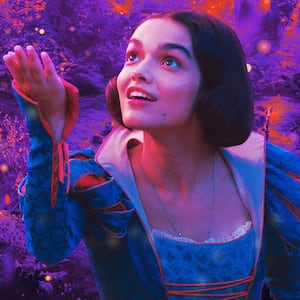There’s something deeply disheartening about the sight of a man casually checking his phone during a funeral speech, and that modestly sad moment is emblematic of The Friend, whose portrait of grief, regret, resentment, anger, survival, and love is distinguished by its simplicity.
An adaptation of Sigrid Nunez’s novel of the same name, writers/directors Scott McGehee and David Siegel’s drama—arriving in theaters on Apr. 4 after celebrated runs at least year’s Toronto and New York film festivals—is many things at once: a compassionate portrait of mourning and the bonds that keep us united; a stirring saga about the emotional support provided by animals (and vice versa); and a welcome showcase for Naomi Watts, who following years of so-so roles gives a tender and poignant performance as a woman grappling with various destabilizing disruptions.
Though Watts’ creative writing professor Iris is the protagonist of The Friend, the film’s title refers to two intertwined characters. The first is Walter (Bill Murray), a famed author who’s recently taken his life, in the process wounding Iris, his long-time BFF, as well as his three ex-wives Elaine (Carla Gugino), Tuesday (Constance Wu), and Barbara (Noma Dumezweni).

The second is Walter’s Great Dane Apollo, a giant canine whose white hair is speckled with black spots (including around his emotive eyes), and whose size impresses anyone he encounters. Iris desperately misses the former and her connection to him earns her the latter when, following his funeral, Barbara informs Iris that Walter always intended for her to take in Apollo after he was gone.
Single, childless, and the resident of a small rent-controlled Greenwich Village apartment that she previously shared with her father, Iris is not interested in Apollo; as she informs Barbara, she’s the type of animal lover who loves cats. Nonetheless, considering that Barbara will otherwise return him to the kennel, she reluctantly accepts this makeshift adoption with the intention of swiftly handing the enormous pooch off to a shelter.
Their maiden evening together doesn’t dissuade her of that idea, what with Apollo immediately taking over her bed and growling at her when she attempts to join him. Apollo is in despair over the loss of his master, and if that weren’t clear from his hangdog look and woeful whimpering, it’s made plain by him instinctively snatching Walter’s Columbia University t-shirt from Iris’ hands so he can cuddle with it.
Apollo is beset by heartache, and his intractability quickly becomes the primary focus of Iris, whose days are spent halfheartedly listening to her students critique each other’s work—and, in office hours, humoring Carter (Owen Teague) as he defends the erotic scenes of his fantasy tales. Her free time is dominated by chats and get-togethers with Elaine and Walter’s adult daughter Val (Sarah Pidgeon), with whom she’s compiling and editing Walter’s correspondences for publication.

McGehee and Siegel don’t bluntly explicate Iris’ relationship to Walter or his many exes, instead providing details about interpersonal dynamics through conversational tidbits. Their writing is natural, easygoing, and without affectation, and the same holds for their clean, unfussy direction, which places a premium on the countenances of their leads—especially Apollo, whose long, unhappy face epitomizes the material’s mood.
Watts’ Iris is unmoored by Walter’s passing and Apollo’s unexpected presence in her home, and her newfound situation is complicated by the fact that—as she’s repeatedly reminded by superintendent Hector (Felix Solis)—her building doesn’t allow pets. With the threat of eviction mounting, Iris searches for a solution, prodded not-so-subtly by her caring neighbor Marjorie (Ann Dowd) and the guests at a New Year’s Eve party.
The real problem for Iris, however, is that the more time she spends with Apollo, the stronger their connection becomes. While it’s obvious that the two are linked by sorrow, The Friend doesn’t press the issue any more than is necessary, allowing the two to grow closer via figurative baby steps, with Apollo warming to Iris cautiously and Iris coming to view the dog as a kindred spirit once she discovers that he’s enlivened by the sound of her reading Walter’s prose.
Iris is a writer herself, albeit one who’s suffering from years-long writer’s block (while working on a manuscript titled, fittingly, “Eastern Blockade”), and her pent-up artistic condition is of a piece with her generally stifled condition.

On her way to ditch Apollo, Iris gets the bright idea to circumnavigate her apartment building’s rules by classifying the dog as a support animal, thereby motivating her to visit her therapist Dr. Warren (Tom McCarthy), who gently suggests that perhaps she’s in as much turmoil as her four-legged companion. Watts doesn’t exaggerate her character’s misery or her epiphany and turnaround, inhabiting Iris with a placid reserve that masks rage, frustration, and anguish over Walter’s suicide—some of which she articulates in narration that adds to the material’s understated literary quality.
The Friend’s narrative skeleton is familiar and yet its execution is deft, with its low-key action exuding a genuine sense of its shot-on-location NYC locales, and punctuated by nuggets of profundity, as when Iris muses that it hurts to not know what past boyfriends—and now Apollo—were like when they were young (to the point that this ignorance makes her feel “cheated”).

McGehee and Siegel’s tale climaxes with an imaginative chat between Iris and Walter during which she finally gives voice to her disappointment and fury. It then closes on a softer note, with Iris venturing to Val’s beachside cabin with Apollo to begin penning a novel about what Walter did to himself, her, and everyone else that cared about him. With her Great Dane by her side, she confesses that she wants him to live as long as he does because “anything less is unfair,” and the straightforwardness of that universal sentiment is quietly, intensely touching.
The Friend’s supporting cast is so good that one wishes they were given more opportunities to stand out; as is, they’re merely vivid, fleeting lights. Watts, however, shines so brightly as the lost and forlorn Iris that the film never falters, right up to a final scene that locates terror, joy, and relief in a single look and sigh. Additionally buoyed by a brief but complicated turn by Murray, it’s a small movie that says big things unassumingly, and movingly.









